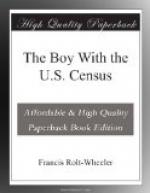“Just doing my work,” the boy answered, “and got carried right along. I was curious at first,—then when I wanted to get out I found I couldn’t. I think,” he added, a little nervously, for the flying jagged bottle had startled him not a little, “that’s the first time I’ve been in front of a mob.”
“I wish it was the last I’m likely to be,” was the reply, “especially a crowd of women like that. Men you know what to do with.”
“What do you suppose they’ll do?” asked the boy. “Try to rush the school?”
“They did once not far from here,” the policeman answered, “it was a school on the East Side, where nearly all the children were Jewish, and in order to make it easier for the poorer children the school authorities had opened a sort of restaurant where the kids could get lunch for three cents. The story got abroad that the children were getting ham and pork, and the whole section rose in arms. We tried to disperse them and couldn’t. There was no way of reasoning with them, there was nothing they could do, but they just hung around.”
“What for?”
“Waiting a chance to burn the school down, every one seemed to think. They did make one rush toward the end of the afternoon, and several people were wounded. One of our men was badly stabbed, but he got over it. Watch now,” he added, in a sharp voice. “There’s something doing!”
The crowd hushed a moment, and a man’s voice could be heard, but whether pacifying the women or inflaming them, Hamilton could not make out. The next moment answered him. Without any apparent preparation, the whole face of the crowd suddenly seemed to burst, the end closed in, and in a second one of the wildest hordes Hamilton had ever seen was at the school gates. There was a brief struggle and nightsticks were drawn. The crowd rolled back, then surged on, more angrily than before. But the bluecoats stood firm, and when the crowd rolled back the second time a number showed broken heads.
“Son,” called the police lieutenant, “you scamper along, and tell the principal to hurry up with letting out the school. I sent him one message now this means business.”
Hamilton turned and ran for all he was worth toward the building, but just as he reached there, he saw the children marching in regular order out of the rear door, and he came back immediately to report. As he did so he found that the crowd was getting ready to make a third attempt to attack the police, when, turning the corner, sauntering down the narrow lane between the crowd and the police, came an Italian boy, about fourteen years old, with half a dozen other ragged boys at his heels. On seeing him, the lieutenant turned to Hamilton.
“That’s Caesar,” he said, with a sigh of relief. “I’ve known him for the past year or two, and he’ll settle all this trouble.”
The boy looked at the police lieutenant with surprise. The police force had had trouble enough, and what could a boy do? He voiced his query.




